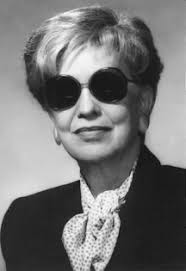Louise Cowan
Louise Cowan | |
|---|---|
 Texan intellectual Louise Cowan | |
| Born | Mary Louise Shillingburg December 22, 1916 |
| Died | November 16, 2015 (aged 98) Dallas, Texas, U.S. |
| Spouse | Donald Cowan |
| Awards | Frankel Prize (1991) |
Mary Louise Cowan (née Shillingburg; December 22, 1916 – November 16, 2015) was an American critic and teacher, and wife of the physicist and University of Dallas president Donald Cowan. She taught at Texas Christian University and Thomas More College of Liberal Arts. Cowan lived in Dallas, where she taught at both at the University of Dallas and the Dallas Institute of Humanities and Culture. As "one of the most famous faculty members"[1] at the University of Dallas, she was a prominent figure in Dallas society, a mentor and friend to many Dallas dignitaries, and one of the city's leading intellectuals.
Education
[edit]A doctoral student of Donald Davidson at Vanderbilt University, she became a friend to members of the Southern Agrarians, and was considered to be the critical heir to their legacy.[2]
Work at the University of Dallas
[edit]She and her husband, Donald Cowan, worked for twenty years to establish the core curriculum at the University of Dallas. They sought to counter relativism and mediocrity by establishing "anti-egalitarian" models based on the classics of Western civilization. They replaced composition courses and textbooks with ancient classics after arriving in 1959. In the 1960s, Louise Cowan conceptualized and established a graduate program in politics and literature; she recruited the conservative Willmoore Kendall, who had previously aroused controversy for his teaching at Yale University.[1] Although successful and popular for decades, conflicts with the Board of Managers led to a protracted leave of absence for both, beginning in 1977. The Cowans resigned in the summer of 1980 in protest over new and "utilitarian" administrative policies,[1] but returned to campus in 1994.[3]
Influence
[edit]Cowan was influential in fostering the liberal arts and helping shape core curricula for several liberal arts universities.[4] The University of Dallas' curriculum in "literary tradition" was her single-handed design.[3] Comic theory was one of her lifelong interests.[5] In studies of the American South, she was an influential critic of William Faulkner, the Fugitive Group, and other Southern writers.[6]
In "A Nation at Risk", Cowan's 1983 report for the Commission on Excellence in Education, she appraised in withering terms what she believed to be the deficiencies of public education. She compared the "mediocre educational performance" in the United States to an "an act of war" on America's well-being as a society.[1]
Awards and honors
[edit]In 1991, she was a recipient of the Frankel Prize.[7][8] As he held the commendatory comments about Cowan, President George Bush said "She ranks among the great builders of education in Texas."[3] Sewanee University awarded her an honorary doctorate in 2014.[9]
She died November 16, 2015, at the age of 98.[10]
Books
[edit]- The Fugitive Group: A Literary History (1959).
- The Southern Critics: An Introduction to the Criticism of John Crowe Ransom, Allen Tate, Donald Davidson, Robert Penn Warren, Cleanth Brooks, and Andrew Lytle (1971).
- The Terrain of Comedy (edited and introduced) (1983).
- Classic Texts and the Nature of Authority: An Account of a Principals' Institute Conducted by the Dallas Institute of Humanities and Culture (edited with Donald Cowan, with essays and commentary) (1993).
- Invitation to the Classics (edited with Os Guinness) (1998).
References
[edit]- ^ a b c d Arbery, Glenn C. (1 April 2022). "An Apostle of Literature". First Things. Retrieved 2024-11-19.
- ^ Carlson, Maurice I. (1974). Cowan, Louise (ed.). "Southern Poets as Southern Critics". Southwest Review. 59 (2): 217–218. ISSN 0038-4712.
- ^ a b c Chernoff, Anthony (2 March 1994). "The Cowans Return to UD (University News (Irving, Tex.), Vol. 19, No. 19)". The Portal to Texas History. p. 1. Retrieved 2024-11-19.
- ^ Cowan, Louise (6 November 1960). "English Emphasis at UD on Classics". Daily News Texan. Irving, Texas. p. 2.
- ^ Walter, James (1987). "The Terrain of Comedy (review)". Religion & Literature. 19 (1): 89–93. ISSN 0888-3769.
- ^ Bradford, M. E. (1992). "Aeschylus in Nashville: "The Case of Motorman 17: Commitment Proceedings" and the Later Poetry of Donald Davidson". The Southern Literary Journal. 25 (1). 61n11. ISSN 0038-4291.
Regarding Donald Davidson's poem, The Case of Motorman 17: "The most useful discussion of this poem in print is by Louise Cowan.
- ^ "Charles Frankel Prize". National Endowment for the Humanities. Retrieved 2024-10-22.
- ^ "President honors five for work in culture". The New York Times. 1991-11-18. pp. C14.
- ^ "Opening Convocation Set for Noon, Jan. 17" (PDF). The Sewanee Mountain Messenger. 10 January 2014. p. 1.
- ^ "Dallas Institute of Humanities and Culture - In Memory of Dr. Louise S. Cowan". dallasinstitute.org. Archived from the original on 2015-11-17. Retrieved 2015-11-16.
External links
[edit]- Louise Cowan's page at the University of Dallas website
- "The Prime of Louise Cowan" in D Magazine
- Interview with Louise Cowan


 French
French Deutsch
Deutsch